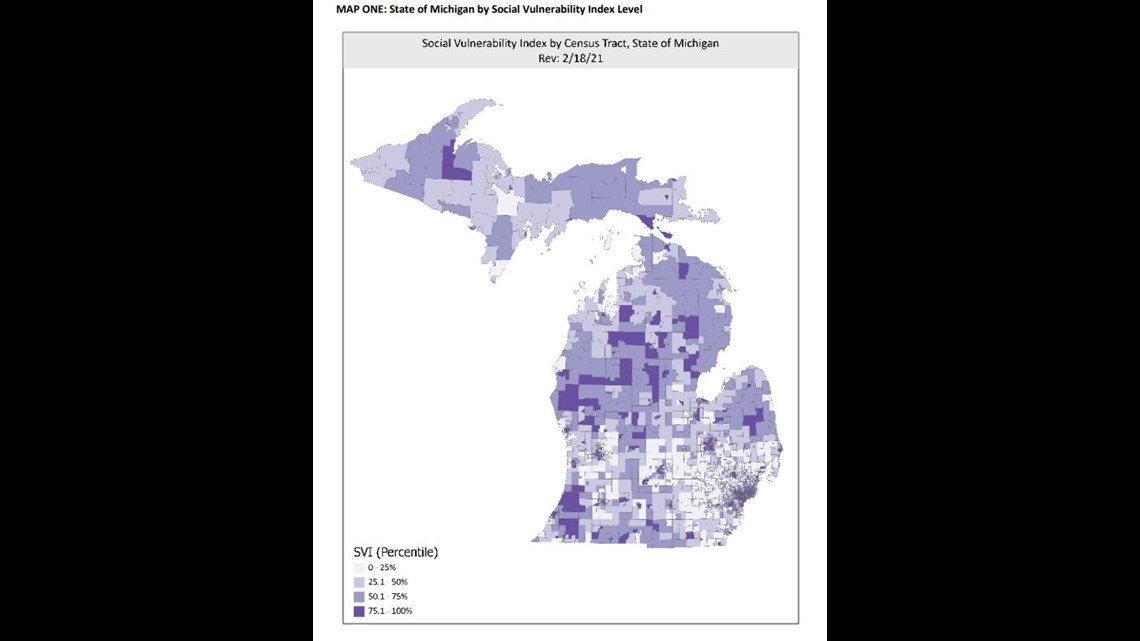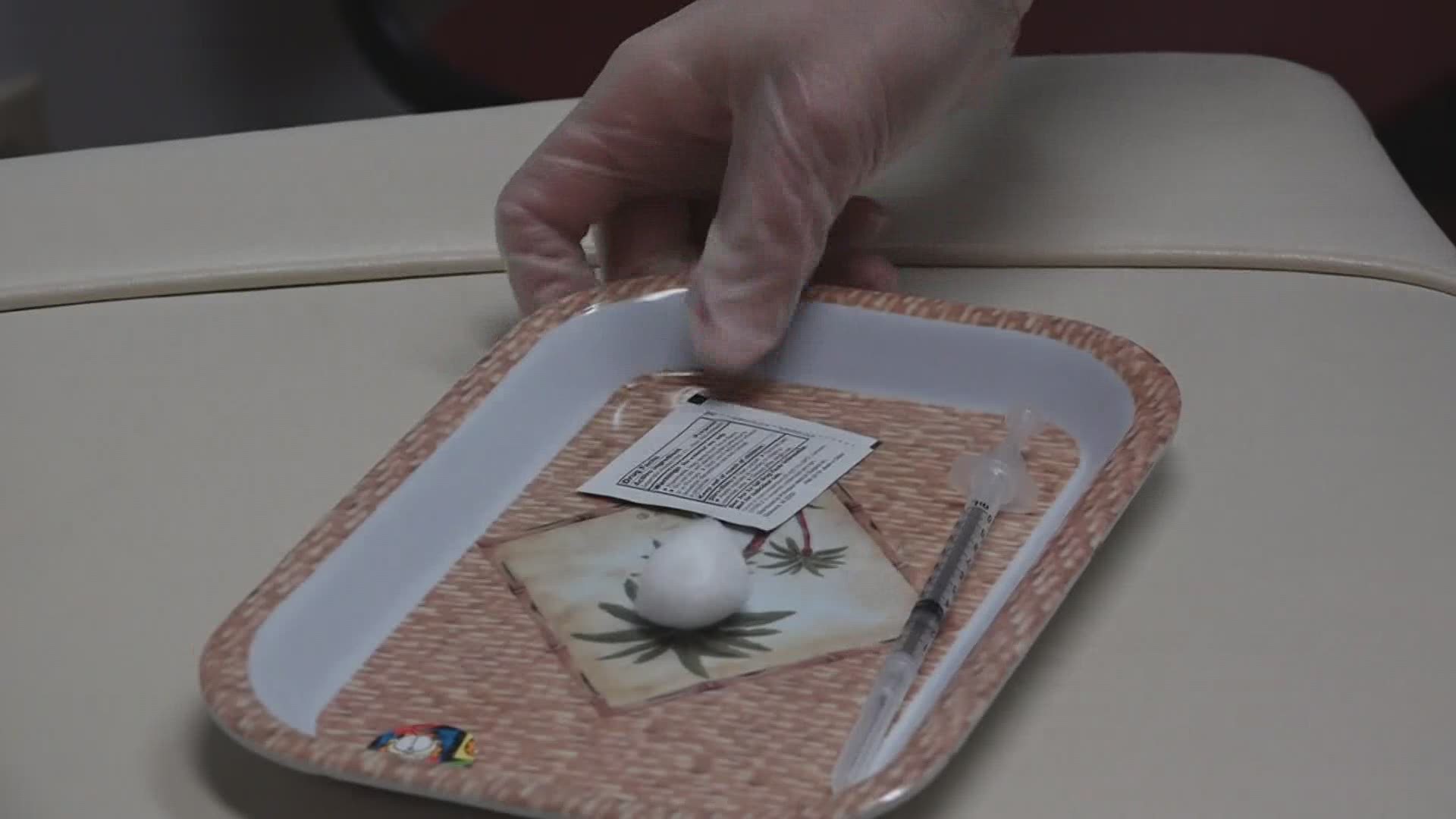The state started posting COVID-19 vaccine data by race on Tuesday, which revealed racial disparities in the rollout that health officials say they are working to offset.
As of Feb. 22, nearly 1.3 million Michigan residents have received at least the first dose of the vaccine, and of them, 41.7% are white and 3.7% are Black.
Black Michigan residents account for about 14% of the state's population.
The data is incomplete because the system used to record immunization information did not previously have an option for directly entering race and ethnicity, an issue that Michigan's Department of Health and Human Services said it has since added.
As of Monday, the race of 43.7% of people who have received the vaccine in Michigan is unknown.
Race data for vaccinations as of Feb. 22 is as follows:
- 43.7% are unknown
- 41.7% are white
- 9.5% are listed as other
- 3.7% are Black
- 1.1% are Asian or Pacific Islander
- 0.3% are American Indian/Alaskan Native
Ethnicity is not yet being reported in the state's COVID-19 vaccine dashboard because only 30% of records had this information, MDHHS said.
“Black and Brown communities have been disproportionately affected by the virus, and improving the race and ethnicity data being collected for vaccinations is critical for ensuring the equitable administration of the vaccine," said Michigan's Chief Medical Executive Dr. Joneigh Khaldun, in a press release.
The cumulative COVID-19 case rate in the state has been 40% higher for Black residents than white residents, and the death rate has been more than three times higher for Black residents than white.
The state says staff is working to improve the data it does have in the Michigan Care Improvement Registry (MCIR), which is used to collect and consolidate patients' immunization information into one record.
“We urge Michiganders to fill out race data questions on forms when they get their vaccine,” said Khaldun, who is also the state's chief deputy of health.
“Knowing this information helps guide the state’s strategy and allows us to address any gaps as we move forward getting Michiganders protected from the virus.”
Last week, the state health department rolled out its vaccine equity strategy, which includes the goal of having "zero racial disparity."
The state also started adjusting vaccine allocations based on the Center for Disease Control and Prevention's Social Vulnerability Index, which "uses 15 U.S. census variables to help local officials identify communities that may need support before, during, or after disasters," according to the CDC website.
The index looks at factors like socioeconomic status, language, transportation, disability and household composition.


Vaccines were first allocated primarily to hospitals based on their number of staff. As the next priority group opened, there was a shift to allocations based on the number of eligible people in each county.
The vaccine rollout in Michigan started in mid-December with healthcare workers and long term care facilities. In January, the state opened up the vaccine to people ages 65 years and older along with some essential workers, like teachers and law enforcement.
Earlier this month, Mercy Health Saint Mary's said that of the people it had given vaccines to, 3% were Latinx and 3% were Black.
In the time since, the Grand Rapids hospital has started offering the vaccine at some of its community clinics and making it more accessible in an effort to close the disparity gap.
Last week, the hospital said 12% of its vaccine allocation went to Latinx patients and 13% went to Black patients.
On Tuesday, Spectrum Health said of the nearly 73,000 first doses it's provided, just over 5% of them have gone to Black and Latinx patients.
"While delay in vaccine supplies have limited our ability to provide vaccine to our entire community, we are especially concerned about vaccination rates among the Black and LatinX communities," the health system said in a statement.
"Those numbers are lower than the populations of those groups within our communities."
Spectrum Health, which is the largest health system in West Michigan, said it has taken steps to address the disparities.
Several weeks ago, Spectrum launched the West Michigan Vaccine Clinic at DeVos Place, alongside Mercy Health Saint Mary's and the Kent County Health Department, which Spectrum says is "easily accessible and on public transportation routes."
Spectrum has also been hosting community-based clinics over the last month at New Hope Baptist Church and the Wyoming Senior Center.
"We understand the urgency of reaching all members of our community with the vaccine as soon as possible and will continue outreach efforts to increase vaccination rates among these populations," Spectrum wrote in a statement.
The state has rolled out several efforts over the last few weeks to get vaccines into underserved areas.
On Tuesday, MDHHS also announced a pilot program that would allocate up to 2,500 doses to vaccine providers with clear plans on how to address barriers.
MDHHS said the percent of Black residents receiving the vaccine tripled from .5% in the first three weeks of the rollout to 3.8% in the last week.
"But, the proportion of vaccinated adults 16 and older who are Black is far lower than the proportion of Black residents in Michigan," a press release read.
The state's goal is to vaccinate 70% of the population ages 16 years and older as soon as possible.
►Make it easy to keep up to date with more stories like this. Download the 13 ON YOUR SIDE app now.
Have a news tip? Email news@13onyourside.com, visit our Facebook page or Twitter. Subscribe to our YouTube channel.

